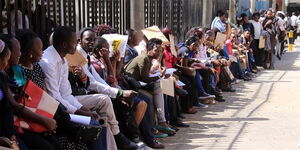Chief Justice Martha Koome on Thursday, August 14 issued a sharp rejoinder to President William Ruto over the Head of State's recent criticism of the judiciary regarding anticipatory bail offered to corruption suspects.
Koome, alongside Attorney Dorcas Oduor, openly differed with the president during the Law Society of Kenya (LSK) Annual Conference in Kwale, arguing that anticipatory bail was not a threat in the pursuit of justice.
While responding to comments made by LSK President Faith Odhiambo, Koome, who was a chief guest at the event, reiterated that suspects, particularly those under investigation over corruption, were still in trouble with the law despite posting anticipatory bail.
"Anticipatory bail is a very interim relief and is issued for a limited number of days (14). It cannot be a threat to the administration of justice," Koome said.
The CJ doubled down on her stance by adding that the real threat to the judicial processes "lies in the withdrawal of anticorruption cases by the state."
A day earlier, Ruto criticised the Judiciary, highlighting the granting of anticipatory bail by the judicial arm of the government as an obstacle to tackling graft.
“We have something called anticipatory bail. It is a Kenyan innovation that takes us backwards. Someone who has stolen public funds, going to court and getting anticipatory bail makes it impossible for such a person to be arrested and prosecuted,” the head of state said at the opening of the National Devolution Conference on Wednesday, August 13.
However, in a rejoinder, Koome justified bail terms, saying the constitutional provisions were not accidental, but by design.
She added, "The bail terms must always be reasonable. The only concern is to ensure that the accused persons attend trial and nothing more. Appellate mechanisms exist to review the bail terms to ensure that they are reasonable. We do not need to be told how to do our jobs."
On her part, Oduor claimed implementation of anticipatory bail was problematic since some of its beneficiaries believe it shields them from prosecution.
In her speech, Koome also defended the judiciary's independence, stressing that no one, including the state, had the authority to selectively obey court orders.
“My position has been unequivocal. Any party aggrieved by a judicial decision, even the government, must seek redress through appeals or reviews – not through defiance or vilification of judges or judicial officers,” Koome said.
A previous report by the Ethics and Anti-Corruption Commission (EACC) revealed that Kenya loses an estimated Ksh608 billion annually due to graft, representing 7.6 per cent of the nations GDP.
According to Koome, the real danger to the administration of justice was complete failure to prosecute corruption cases.
LSK President Faith Odhiambo also backed Koome's sentiments, reiterating that anticipatory bail was a standard requirement not only in Kenya and did not constitute to the endorsement of crime.












